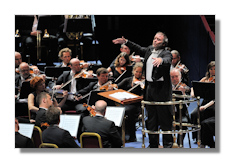
The Internet's Premier Classical Music Source
Related Links
- Latest Reviews
- More Reviews
-
By Composer
-
Collections
DVD & Blu-ray
Books
Concert Reviews
Articles/Interviews
Software
Audio
Search Amazon
Recommended Links
Site News
 Concert Review
Concert Review
Gergiev at the BBC Proms

By Marc Haegeman
- Piotr Ilyitch Tchaikovsky: Swan Lake
Orchestra of the Mariinsky Theatre, St. Petersburg/Valery Gergiev
BBC Proms - London, Royal Albert Hall (15 August 2011)
Of the three Tchaikovsky ballets, Swan Lake is in spite of its ever-lasting popularity the most unfortunate. Unlike The Sleeping Beauty and The Nutcracker, Tchaikovsky's first attempt in the genre has from the start been tampered with, not to say mutilated, and even to this day dance-makers of all talent feel free to ravish the score at will to suit their purposes. As if somebody today would alter the order and content of a Verdi or Wagner opera because that is considered an improvement.
The trouble started when the creation of Swan Lake in Moscow in 1877 flopped. The symphonic dimension of the music baffled contemporaries and much of it was considered undanceable. Little did they know. Tchaikovsky's approach to ballet music was by all means different from the then current manner of crafting interchangeable and dutiful accompaniments of dance. By balancing a powerful dance drama with brilliant divertissement passages and by investing the whole work with an indelible character, always keeping the tragic story in focus, Tchaikovsky opened new doors for this genre and paved the way for composers in the next century as varied as Stravinsky, Prokofiev, Bartók, Vaughan Williams and Britten.
However, it was only after his untimely death, with a new staging at the Mariinsky Theatre in St. Petersburg in 1895, masterminded by the choreographers Marius Petipa and Lev Ivanov, involving a new scenario and quite a radical adaptation of the score by the theatre's conductor/composer Riccardo Drigo, that Swan Lake achieved immortality. Yet, success came at a serious price. Over 2,150 bars of the original music were ditched by Drigo, who on the other hand interpolated three orchestrated numbers from Tchaikovsky's Op. 72 piano pieces. The most famous reordering concerned the so-called Black Swan pas de deux in the ballroom scene for which the music was actually plucked out of the first act and went on to serve a totally different purpose than Tchaikovsky ever intended. But no matter, this was the version that was meant to stay. It not only never left the repertoire of the Mariinsky to this day, it has also been serving as the Urtext for productions of the ballet worldwide.
Bizarrely enough, it was this 1895 theatre adaptation of Swan Lake that Valery Gergiev and his Orchestra of the Mariinsky Theatre proposed at the BBC Proms. The full-length score is hardly ever heard in concert and while the original music as composed by Tchaikovsky can easily stand on its own without the visual support of the dance, this particular stage version fares less well in the concert hall. Not only is the succession of the numbers often bizarre (not to mention that Tchaikovsky's careful key scheme is totally lost), listening to variations for solo dancers taken out of their theatrical context makes little sense and the flow of the music is interrupted by Drigo's interpolations – worst of all in the last Act. (Incidentally, this was also the version that Gergiev and the Mariinsky recorded for Decca CD and DVD in 2007.)
That being said, there was plenty to enjoy in this concert and it is always a delight to hear an orchestra like the Mariinsky's which is this much attuned to the music by generations of performing practice. The antiphonal placement of the strings, full of character and warmth, emphasized Tchaikovsky's inspiration to magnificent effect. The dark sounding brass and the prominent percussion section brought even more color and impact. Gergiev's analytical, almost surgical treatment of the score sometimes threatened to blur the sweep, but on the other hand it's hard to imagine a conductor today who can bring out that much shading and details, or has such ear for the polyphony of the writing. Conducting with his bare hands, overall he secured a convincing orchestral balance. The Mariinsky Orchestra moreover boasts a superb woodwinds section and the main oboe player who has such a significant role in this ballet (with the oboe carrying all the main themes) really was the star of the evening (one assumes Sergei Bliznetsov). The orchestra leader (Kirill Terentiev) performed the violin solos in the adagios with a genuine romantic feel as well as mastery, while the harp player (Odarka Voshak) provided the required magical atmosphere of the lakeside scenes. Gergiev is no ballet conductor, but freed from the restrictions of a stage performance he handled the danced passages with plenty of flair. The dramatic scenes were painted with bold strokes. Even if it was felt that some numbers were played rather briskly, only the national dances in the ballroom scene sounded like throwaway percussion-driven showpieces.
If anything, Valery Gergiev and his Mariinsky forces have proven that ballet music of this level deserves and does stand a chance in the concert hall. Opera's are brought as concert performances all the time, yet ballet is still too often considered second-grade music, allegedly a waste of time to be heard on its own. Not surprisingly the complete Swan Lake was making its Proms debut. Even if Gergiev had chosen for the less obvious, performing version, Tchaikovsky's music no less held the packed Royal Albert Hall spellbound and was rightfully given a massive reception. More of that, please.
Copyright © 2011, Marc Haegeman












